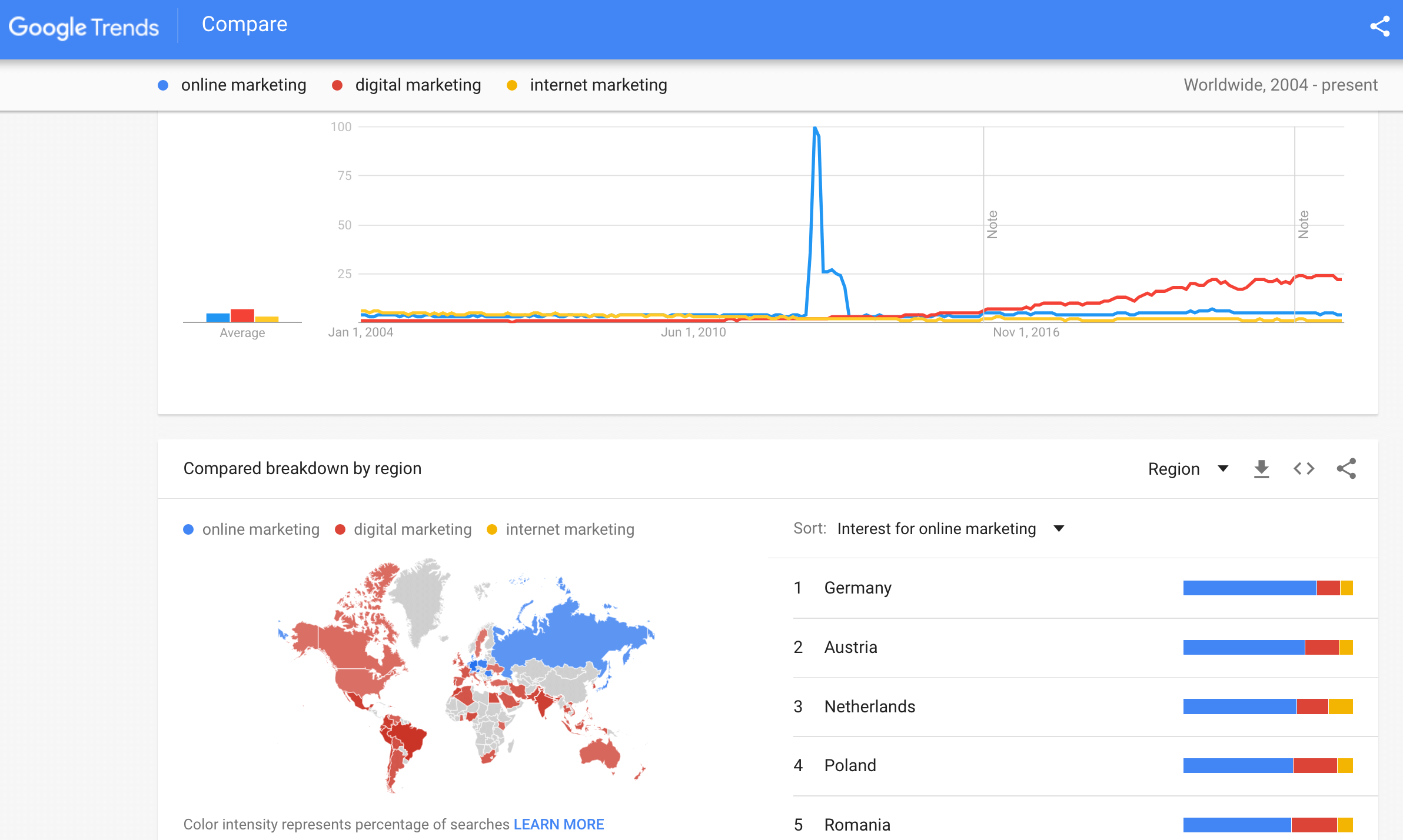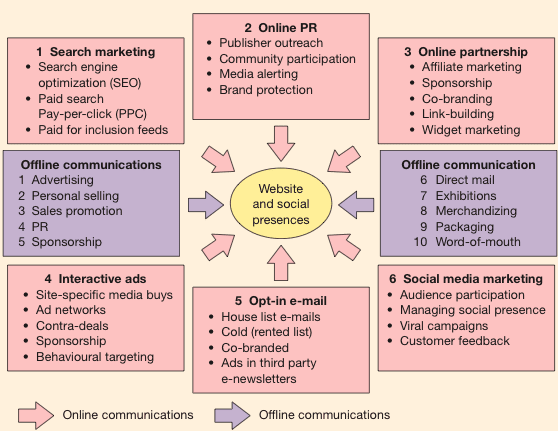What is the difference and does it matter?!
Before Digital marketing became the de-facto term, I've been asked this question a lot across the years... does the difference in scope between these terms matter? So, as we enter 2023, I thought it was time for another quick look. Here is the latest comparison from Google Trends between 2004 and present

Does the difference in these terms and their definitions matter? No, of course not, it's semantics! But it is interesting to see how the scope of Internet marketing vs Digital marketing has changed over time. In my books, when discussing alternative definitions, I explain that, no it doesn't really matter, but the scope and responsibility is important to make the most of managing the opportunities. So the scope of digital marketing activities should be agreed within a business and/or between a company and its agencies. The biggest difference is whether digital marketing is simply seen as about communications (online marketing) or whether it is broader, looking at underpinning marketing technology and options for new online business and revenue models.
The books I've written have actually had three different titles, updated to move with the times. My first text book was titled: Internet Marketing: Strategy, Implementation and Practice. I then created E-business E-commerce Management and, with PR Smith, E-marketing Excellence, for professionals a couple of years later. Then, much later, the names switched and in 2012 we renamed the Internet Marketing book to Digital Marketing with the others becoming Digital Business and Digital Marketing Excellence. About time too, since I was involved in developing the syllabus as an examiner for the first IDM Diploma in Digital Marketing back in 2004-5 when the term was hardly used at all - so it's been great to see 'Digital Marketing' adopted as the 'de facto' term, when I was first involved in defining it with the IDM students in 2004!
Marketing vs Digital marketing
Today, perhaps the bigger question is whether digital marketing is a necessary term concept since some commentators have stated that we're now in a post-digital era with 'almost all' marketing now being digital now digital media and technology have become so pervasive. My view on this, explained in the post above is that we do very much need digital marketing, since many businesses still undergoing digital transformation and recruiting the digital marketing jobs and roles needed to compete. The trend in search volume also suggests there are more people searching for digital marketing than ever before, albeit with a drop before Christmas.
You could also say that what's more useful is to know within the many different aspects of digital marketing, what is important for getting results today. I agree. See these trends in marketing for 2017 for more. Others also ask, What is Digital Marketing?.
When we wrote the original Internet marketing: Strategy, Implementation and Practice book in 2000 I used a simple definition of Internet marketing. Internet marketing is...
“Achieving marketing objectives through applying digital technologies.”
I used this succinct definition to helps remind us that it is the results delivered by technology that should determine investment in Internet marketing, not the adoption of the technology!
To help make sure that digital marketing is aligned with growing a business we've developed the RACE marketing strategy framework on Smart Insights which shows how to achieve growth through e-marketing in these 5 areas:
These digital technologies include Internet media such as desktop and mobile web sites and e-mail as well as other digital media such as wireless or mobile and media for delivering digital Television such as cable and satellite.
In practice, Internet marketing will include the use of a company web site in conjunction with online promotional techniques described in Chapter 8 of the book such as search engine marketing, interactive advertising, e-mail marketing and partnership arrangements (affiliate marketing) with other web sites. Some businesses who "want to be top in Google", simply consider Internet marketing to simply equate to Search Engine Marketing, but while this is important this scope is too narrow to take full advantage of digital media.
I identify 6 main types of digital media communications channels which every business should consider as part of digital marketing:

These can be facilitated through the desktop or mobile web. We have more details on the strategy in our visual emarketing strategy guide.
These techniques are used to support objectives of acquiring new customers and providing services to existing customers that help develop the customer relationship.
Definitions of Digital Marketing vs Internet marketing vs Online marketing
However, for Internet marketing to be successful there is still a necessity for integration of these techniques with traditional media such as print, TV and direct mail. This is multi-channel Emarketing.
Digital marketing definition
Digital marketing is yet another term similar to Emarketing. It's a term increasingly used by specialist digital marketing agencies and the new media trade publications. The Institute of Direct Marketing has also adopted the term to refer to its specialist professional qualifications.
To help explain the scope and approaches used for digital marketing working with the IDM in 2005 I developed a more (too?) detailed definition than the simple one at the start of this post to better scope it and show how digital marketing needs to be closely aligned to broader marketing objectives and activities and involves much more than SEO and inbound marketing. So this is the original definition from 2005 - how should it change now?
"Digital marketing involves:
Applying these technologies which form online channels to market, that's Web, e-mail, databases, plus mobile/wireless & digital TV)
To achieve these objectives:
Support marketing activities aimed at achieving
profitable acquisition and retention of customers… within a multi-channel buying process and customer lifecycle
Through using these marketing tactics:
Recognising the strategic importance of digital technologies and
developing a planned approach to reach and migrate customers to online services through e-communications and traditional communications. Retention is achieved through improving our customer knowledge (of their profiles,behaviour, value and loyalty drivers), then delivering integrated, targeted communications and online services that match their individual needs".
The first part of the definition illustrates the range of access platforms and communications tools that form the online channels which e-marketers use to build and develop relationships with customers. The access platforms or hardware include PCs, mobile phones and interactive digital TV (IPTV) and these deliver content and enable interaction through different online communication tools such as organisation web sites, portals, search engines, blogs , e-mail, instant messaging and text messaging. Some also include traditional voice telephone as part of digital marketing.
The second part of the description shows that it should not be the technology that drives digital marketing, but the business returns from gaining new customers and maintaining relationships with existing customers.
It also emphasises how digital marketing does not occur in isolation, but is most effective when it is integrated with other communications channels such as phone, direct mail or face-to-face. As we have said, the role of the Internet in supporting multi-channel marketing is another recurring theme in this book and chapters 5 and 6 in particular explain its role in supporting different customer communications channels and distribution channels.
Online channels should also be used to support the whole buying process from pre-sale to sale to post-sale and further development of customer relationships.
Online marketing definition
Online marketing can be considered to be equivalent to Internet marketing and Digital Marketing. Most in the industry would look at it this way.
However, digital marketing is sometimes considered to have a broader scope than online marketing since it refers to digital media such as web, e-mail and wireless media, but also includes management of digital customer data and electronic customer relationship management systems (E-CRM systems).
Multi-channel marketing
Customer communications and product distribution are supported by a combination of digital and traditional channels at different points in the buying cycle
The final part of the description summarises approaches to customer-centric emarketing. It shows how success online requires a planned approach to migrate existing customers to online channels and acquire new customers by selecting the appropriate mix of e-communications and traditional communications. Retention of online customers needs to be based on developing customer insight by researching their characteristics, behaviour, what they value, what keeps them loyal and then delivering tailored, relevant web and e-mail communications.
Customer insight definition
Knowledge about customers needs, characteristics, preferences and behaviours based on analysis of qualitative and quantitative data. Specific insights can be used to inform marketing tactics directed at groups of customers with shared characteristics








